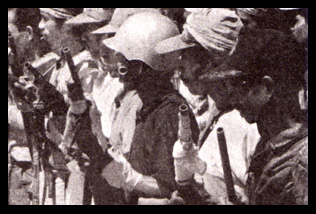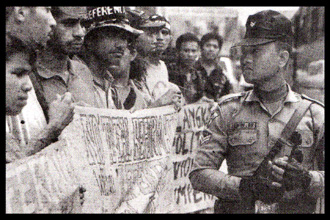Background
The struggle for independence anywhere in the world
brings forth victims who present complaints of human rights abuses. The
experience of the Maubere people (better known as the people of Timor
Larosae) in their struggle for freedom from Indonesian colonialism,
spanning approximately a quarter of a century is no different.
 The world saw clearly how colonialist Indonesia invaded
the island in December of 1975 and how it deprived the people of their
human rights for 24 years. As a result of the above mentioned invasion,
the area of Timor Larosae automatically became a part of colonized
Indonesia. The strength of the colonialist Indonesia became even stronger
in the land of Larosae with the establishment of a military state, with
the Indonesian military as "controllers."
The world saw clearly how colonialist Indonesia invaded
the island in December of 1975 and how it deprived the people of their
human rights for 24 years. As a result of the above mentioned invasion,
the area of Timor Larosae automatically became a part of colonized
Indonesia. The strength of the colonialist Indonesia became even stronger
in the land of Larosae with the establishment of a military state, with
the Indonesian military as "controllers."
The dual function of ABRI (Angkatan Bersanjata
Republic Indonesia / Armed Forces of the Republic of Indonesia)
represented a military ideology that was ultimate and which created a life
of negativity for civil society. The dual function function became a
legitimizing factor for the military to implement very repressive policies
which eliminated the freedom of the Timor Larosae people to live a wholly
humane existence. The violent actions of the Indonesian military also
became an integrated part of the community. Ironically, even now, the
community sees violence as a normal occurrence even in freedom.
At the same time, the other side of repressive policies
was the refusal of colonialist Indonesia to acknowledge the basic rights
of the Timor Larosae people-rights which are supposed to be a reality in
the freedom movement (e.g. the right to have an organization , the right
to assembly, freedom of expression, right to life and freedom of the
press). The law, which should be a protector of the community's right,
became a tool of the military and became an instrument of state
repression. The law, which was born and developed within civil society,
was deplorably used to suppress the rights and freedom of its members.
this problem was also supported by a highly partisan court system and a
weak government as well as, which under the control of the military.
There was only one reason for the colonialist
Indonesian government to create a repressive system in Timor Larosae: the
strong resistance to the military invasion of 1975. This repressive
apparatus was a product of the military, and in practice became even more
consuming when the Indonesian military used a strategy of murder,
containment, torture and rape; interpreting the pro-independence movement
as a security problem (Gerakan Pengacau Keamanan), and even using
involuntary disappearances to weaken society's resistance and ensure the
status quo over the land of Timor Larosae and everything in it.
More specifically on involuntary disappearances, the
Indonesian Military used the following patterns and operations:
* Through intelijen (intelligence) operations
- Better known as "sweeping" which was carried out with the use of masks
(commonly known as "ninja operations") on the civilian population. In
general, this operation was done on someone accused of being a supporter
of the independence movement by kidnapping the accused.
* Arrest without legal procedures of those who were
active during gatherings / meetings and demonstrations and who were
suspected of being pro-independence. These arrests were followed by
torture during the investigations. There are thousands of cases proving
that several victims never returned to their families after their arrest.
* Carrying out policies and / or regulations which
curtail the growth of civil society and emasculate resistance to
Indonesian colonialism (e.g. prohibition to freely gather and organize and
censorship of the press).
* Summons of a specific nature by the police or
military for critical members of the community and who subsequently did
not return.
*Dismissing the freedom movement as a security
hazard (GPK) which had the effect of dividing the strength of the people.
* Mass murders carried out by ABRI - The most
obvious examples were the Santa Cruz Massacre on November 12, 1991 and the
militia rampage after the 1999 referendum. About 272 people were killed or
were reported missing as a result of these events, while the Indonesian
government noted only 13 deaths.
* The creation of armed community groups whose role
and function were no different from the military (i.e. the militias) -
These were created a year ago to "raze the earth" after the people won in
the referendum. The proof is that the militia and the Indonesian military
used the same work pattern in response to the referendum victory (e.g.
mass murders, physical and psychological intimidation, involuntary
disappearance regardless of age or sex).
Livelihood of the Families of Victims of Human Rights Violations
The people of Timor Larosae have become very
accustomed to the series of murders, kidnappings, arrests, and involuntary
disappearances done by the Indonesian colonial regime. The main problem is
the lack of social understanding that these aberrations were spawned by
authoritarian government policies. This happens because there is an uneven
strength between state and civil society. This imbalance denies the
community of participation in the formulation of political policies. this
happens because of the role of government is too strong and that of the
community is too weak. Society would have to understand that authoritarian
government exist because there is no democratic space for social
expression.
One way to empower society is to strengthen the
people's right to self-organization. The initial target would be the
families of the disappeared to followed by the community in general. This
agendum can be achieved by identifying key actors for anti-involuntary
disappearance movement so that they can understand where complaints and
other legal matters can be directed to.
Exactly three months ago, on 30 August 2000, the
Association of Families of Missing People (AKKOH) was formed in Dili.
Through this organization, the families of missing people attempted to
understand the structural problems concerning the disappearance of their
family members, prepared charges against the main offenders, developed
solidarity and integrated their legal campaigns with other cases of human
rights abuses in East Timor.
Obstacles
 Last year's referendum created the following legal and
political consequences concerning the charges of the families of the
victims of enforced disappearance.
Last year's referendum created the following legal and
political consequences concerning the charges of the families of the
victims of enforced disappearance.
first was the difficulty of sustaining the campaign due
to the families loss of interest and their acceptance of their relatives'
fate.
Second, too many issues have surfaced after the
referendum, which have weakened the campaign of AKKOH. One of these is
the issue of reconciliation, which is being discussed more often by
leaders and community members who have a clear understanding of the
problem. The issue of reconciliation is realy affecting the Timor Larosae
people's previous charges which are brought before an International Court
that is dependent and transparent in the face of human rights abuses by
the Indonesian regime in the land of Larosae.
Third, weak solidarity from friends who were
previously active in supporting the freedom of Timor Larosae. There
needs to be another international meeting to collectively address the
human rights abuses.
Fourth, AKKOH and also other community organizations
have gathered thousands of bits of data concerning missing people from one
event to another. the question is how to use these data and
information in the best way. Another problem is how to ensure the
continuous input of the data about involuntary disappearances from the
victims' families.
Fifth, how to sustain the issue and keep the
families of victims of involuntary disappearance steadfast in pursuing
their charges, specifically by AKKOH and the wider community. This
struggle will always need international solidarity.
Finally, how to develop and sustain solidarity of
victims' families between countries, by acknowledging the same basic
problem: the disappearance of their family members. The independence
of Timor Larosae has produced the best road to travel for the community of
Timor Larosae to continue with its charges and demands and to receive
answers about their missing family members. Another point is the need to
continue to demand for the formation of an independent and transparent
international court that would investigate the abuses and prosecute
abusers of human rights in the land of Timor Larosae.
___________________________
NOTES:
1 Written by Vicente de Costa Pinto, Isabel Ferreira,
Selma Hayek. Presented at the "Meeting of Asian and Latin American Lawyers
on Involuntary Disappearances", Jakarta, Indonesia, November 27-December
2,2000. The writers were previously active in "The Commission of Missing
People and Victims of Violence in Indonesia (KontraS)", in Dili and
Jakarta.
2 A non-government organization whose focus is on human
rights in Timor Larosae. ETHRC has supported the formation of the
Association of Families of Missing People (AKKOH), in Dili, Timor Larosae.
 The world saw clearly how colonialist Indonesia invaded
the island in December of 1975 and how it deprived the people of their
human rights for 24 years. As a result of the above mentioned invasion,
the area of Timor Larosae automatically became a part of colonized
Indonesia. The strength of the colonialist Indonesia became even stronger
in the land of Larosae with the establishment of a military state, with
the Indonesian military as "controllers."
The world saw clearly how colonialist Indonesia invaded
the island in December of 1975 and how it deprived the people of their
human rights for 24 years. As a result of the above mentioned invasion,
the area of Timor Larosae automatically became a part of colonized
Indonesia. The strength of the colonialist Indonesia became even stronger
in the land of Larosae with the establishment of a military state, with
the Indonesian military as "controllers."  Last year's referendum created the following legal and
political consequences concerning the charges of the families of the
victims of enforced disappearance.
Last year's referendum created the following legal and
political consequences concerning the charges of the families of the
victims of enforced disappearance.